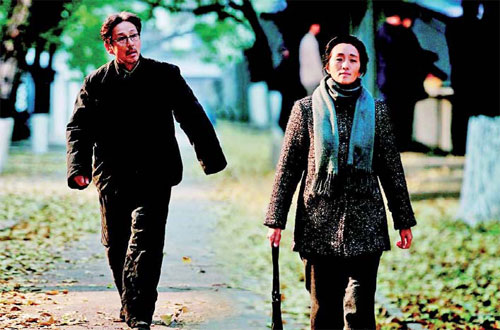Coming home to societal trauma
Updated: 2014-10-17 11:09
By Terence Hsieh(China Daily Europe)
|
|||||||||||
Cinematic master Zhang Yimou's latest film about lives interrupted by political turmoil walks a thin line and earns some brickbats from critics in the process
Zhang Yimou's transformation to national hero over the years has served as a prototype and mirror for the incorporation and co-option of China's fringe artists into the mainstream spotlight.
Zhang's early films To Live (活着) and Raise the Red Lantern (大红灯笼高高挂) galvanized the West and drew the ire of the Chinese government through its heartbreaking stories of life in the "cultural revolution" (1966-76).
Recently, though, Zhang has come under fire from both Chinese and Western critics for a slew of projects and films that seem to serve as a mouthpiece for the mainstream.
Simultaneously a national hero and an artist with very strong beliefs, Zhang (as well as the current generation of new Chinese artists) have had to strike a balance not just between mainstream versus personal aesthetics, but of personal versus public political considerations as well.
In this vein, Coming Home, Zhang's latest tear-inducing melodrama about lives interrupted by the political turmoil of the "cultural revolution", stands squarely atop this thin line.
Based on the book The Criminal Lu Yanshi (陆犯焉识), the film Coming Home is a tale about the struggles of a family to survive in the chaos of that period.
Chen Daoming plays the titular character, a college professor and political rightist imprisoned during the anti-rightist campaigns of 1957-59, and Gong Li, his wife.
While much of the movie takes place after the "cultural revolution", elements of the drama are woven in as precursors to the struggles of the protagonists during that time of chaos. The movie opens as Chen escapes from prison. Yet, his daughter Dandan, a young ballerina who pines for the role of lead dancer, voluntarily turns him in upon his arrival.
Workers' Propaganda Team director: Have you been in touch lately?
Nǐmen zuìjìn gēn tā yǒu liánxì ma?
你们最近跟他有联系吗?
Feng Wanyu: No. We have heard nothing about him for over 10 years.
Méiyǒu, shí jǐ nián méi tā de xiāoxi le.
没有,十几年没他的消息了。
Director: Good. I have asked you to come here today specifically to tell you two things: one is that once you find the fugitive's whereabouts, report to us immediately and cooperate with our investigation and capture; the second thing is that meeting the fugitive is not allowed. You should know your stance and keep your distance from him. Have I made myself clear? Give me your word.
Hǎo. Wǒ jīntiān bǎ nǐmen jiāshǔ jiào guòlái, jiùshì tōngzhī nǐmen: yī, fāxiàn táofàn de xíngzōng lìjì bàogào, pèihé zǔzhī diàochá zhuābǔ; èr, yánjìn yǔ táofàn jiànmiàn, zhàn wěn lìchǎng, huà qīng jièxiàn. Tīngqīng le ma? Biǎo ge tài ba.
好。我今天把你们家属叫过来,就是通知你们:一,发现逃犯的行踪立即报告,配合组织调查抓捕;二,严禁与逃犯见面,站稳立场,划清界限。听清了吗?表个态吧。
Dandan: He has nothing to do with me. I'll follow the Party's decisions.
Tā gēnwǒ méiguānxi, wǒ fúcóng zǔzhī juédìng.
他跟我没关系,我服从组织决定。
We then find ourselves at the end of the "cultural revolution" as Lu is released from prison. Returning home, he finds that his wife has suffered greatly from personal and familial tragedies that have caused her irreparable psychological damage.
Feng: I may have seen him somewhere. Who is this guy?
Wǒ hǎoxiàng zài nǎr jiàn guo tā. Tā shì shéi a?
我好像在哪儿见过他。他是谁啊?
Dandan: Lu Yanshi, of course.
Lù Yānshí a
陆焉识啊。
Feng: You are talking nonsense. Dandan, stop bringing strangers to my apartment from now on. Do you hear me? And give me that photo. You will cut your father out if you keep it.
Nǐ húshuō shénme Lù Yānshí. Dāndan, nǐ yǐhòu bùyào dài zhèzhǒng mòshēngrén dào wǒ zhèr lǎi. Nǐ tīngjian méiyou? Zhàopiān bù néng fàng nǐ zhèr. Fàng nǐ zhèr, nǐ yòu bǎ nǐbà jiǎn le.
你胡说什么陆焉识。丹丹,你以后不要带这种陌生人到我这儿来。你听见没有?照片不能放你这儿。放你这儿,你又把你爸剪了。
She no longer remembers who he is. Lu attempts to re-establish his relationship with her as a loving husband, and they slowly begin to dust off and recover their family. It's a literal story of amnesia that mirrors the amnesia that surrounds the "cultural revolution".
While that message has, perhaps, been emphasized to an excessive degree in modern China, Zhang does it tastefully and is careful to walk around the perceived excesses of youth culture in today's society.
Instead of issuing the same condemnation of material wealth that is directed at so many young Chinese men and women, Coming Home seems to say that things matter.
In this way, Coming Home is really a love story. "Nobody can get away from whatever you inherit from your own history, from your parents and grandparents.
So how do you treat history? How can you, the nation, the people, how can you survive history?" The answer is "family love", says Zhang Zhao, the movie's producer, in a recent New York Times interview.
Not everyone's enamored by Coming Home, though. Some critics have panned it as repetitively motif-driven, especially regarding the themes of amnesia and recognition, while others have considered it too simple to be considered a serious film.
While in premise, the story sounds like something out of a soap opera, it's easy to get carried away by the delicacy with which Zhang, the director, handles the affair and the emotions surrounding an aging couple struggling to stay together, backlit by the fires of political strife.
His veteran hands craft and cradle the story with the kind of care rarely found in mainstream Chinese film.
Is Coming Home too simple to be considered a relevant political commentary about the "cultural revolution"?
Is this a sentimental mainstream film, or a delicately handled cultural masterpiece? Just as we saw in Black Coal, Thin Ice (the closest thing we've ever seen to blockbuster art cinema), why can't it be both? For one, it's aimed at an aging generation who never had a chance to unpack the trials and tribulations of political turmoil. While Coming Home may treat the "cultural revolution" as an afterthought, it's certainly one with a strong aftertaste.
Courtesy of the World of Chinese www.theworldofchinese.com
The World of Chinese
|
Zhang Yimou's film Coming Home deals with the turmoil of the "cultural revolution" (1966-76). |
|
Feng Wanyu (right), played by Gong Li, ignores her husband Lu Yanshi (left) - a man she no longer remembers when he comes home from prison. Provided to China Daily |
(China Daily European Weekly 10/17/2014 page27)
Today's Top News
Chinese, Italian companies sign $10b
Tony Blair home address discovered in terror suspect's car
HK barricades taken down by police
Hesitant panda heads for forest
High-speed rail part of deals worth $10b
'Minimum force' to remove protest road barriers in Hong Kong
Spain's Catalonia to call off independence referendum
Alibaba set to expand 'double 11'
Hot Topics
Lunar probe , China growth forecasts, Emission rules get tougher, China seen through 'colored lens', International board,
Editor's Picks

|

|

|

|

|

|







